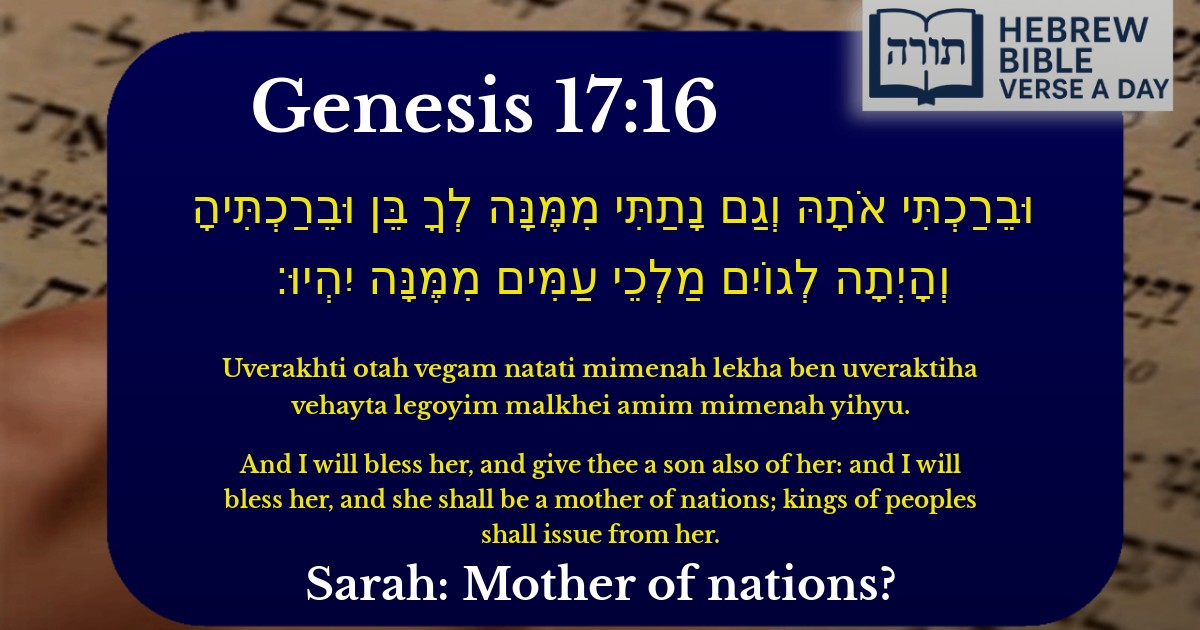Join Our Newsletter To Be Informed When New Videos Are Posted
Join the thousands of fellow Studends who rely on our videos to learn how to read the bible in Hebrew for free!
Hebrew Text
וּבֵרַכְתִּי אֹתָהּ וְגַם נָתַתִּי מִמֶּנָּה לְךָ בֵּן וּבֵרַכְתִּיהָ וְהָיְתָה לְגוֹיִם מַלְכֵי עַמִּים מִמֶּנָּה יִהְיוּ׃
English Translation
And I will bless her, and give thee a son also of her: and I will bless her, and she shall be a mother of nations; kings of peoples shall issue from her.
Transliteration
Uverakhti otah vegam natati mimenah lekha ben uveraktiha vehayta legoyim malkhei amim mimenah yihyu.
Hebrew Leining Text
וּבֵרַכְתִּ֣י אֹתָ֔הּ וְגַ֨ם נָתַ֧תִּי מִמֶּ֛נָּה לְךָ֖ בֵּ֑ן וּבֵֽרַכְתִּ֙יהָ֙ וְהָֽיְתָ֣ה לְגוֹיִ֔ם מַלְכֵ֥י עַמִּ֖ים מִמֶּ֥נָּה יִהְיֽוּ׃
וּבֵרַכְתִּ֣י אֹתָ֔הּ וְגַ֨ם נָתַ֧תִּי מִמֶּ֛נָּה לְךָ֖ בֵּ֑ן וּבֵֽרַכְתִּ֙יהָ֙ וְהָֽיְתָ֣ה לְגוֹיִ֔ם מַלְכֵ֥י עַמִּ֖ים מִמֶּ֥נָּה יִהְיֽוּ׃
🎵 Listen to leining
Parasha Commentary
📚 Talmud Citations
This verse is not quoted in the Talmud.


Context of the Verse
This verse (Bereshit 17:16) is part of Hashem's covenant with Avraham, where He promises blessings to Sarah and announces the future birth of Yitzchak. The verse emphasizes Sarah's pivotal role in the continuation of Avraham's lineage and the formation of future nations.
Rashi's Commentary
Rashi explains that the repetition of "וּבֵרַכְתִּיהָ" ("and I will bless her") signifies two distinct blessings:
Ibn Ezra's Insight
Ibn Ezra notes that the phrase "מִמֶּנָּה" ("from her") is repeated to stress that the future kings and nations will descend directly from Sarah, not from Hagar or Keturah. This underscores Sarah's exclusive role as the matriarch of the Jewish people.
Rambam's Perspective
In Moreh Nevuchim (1:42), Rambam interprets the promise of kings ("מַלְכֵי עַמִּים") as referring not only to physical descendants but also to spiritual leaders who would emerge from Sarah's lineage, guiding nations through wisdom and righteousness.
Midrashic Interpretation
Bereshit Rabbah (47:1) elaborates that "וְהָיְתָה לְגוֹיִם" ("she shall be a mother of nations") includes:
Halachic Implication
The Kli Yakar highlights that Sarah's blessing sets a precedent for the matrilineal transmission of Jewish identity. Just as Yitzchak's lineage is traced through Sarah, Jewish law follows the mother's line (based on Devarim 7:4 and Talmud Kiddushin 68b).